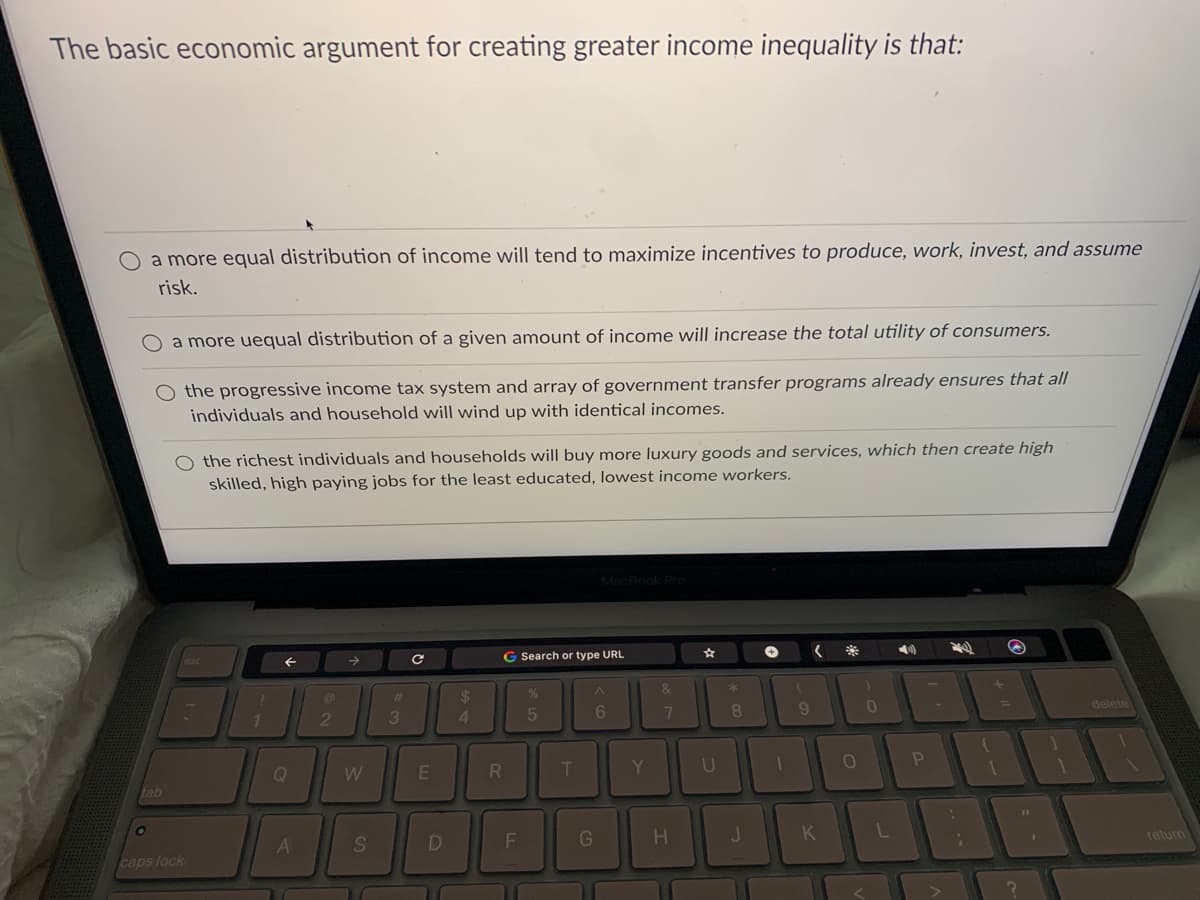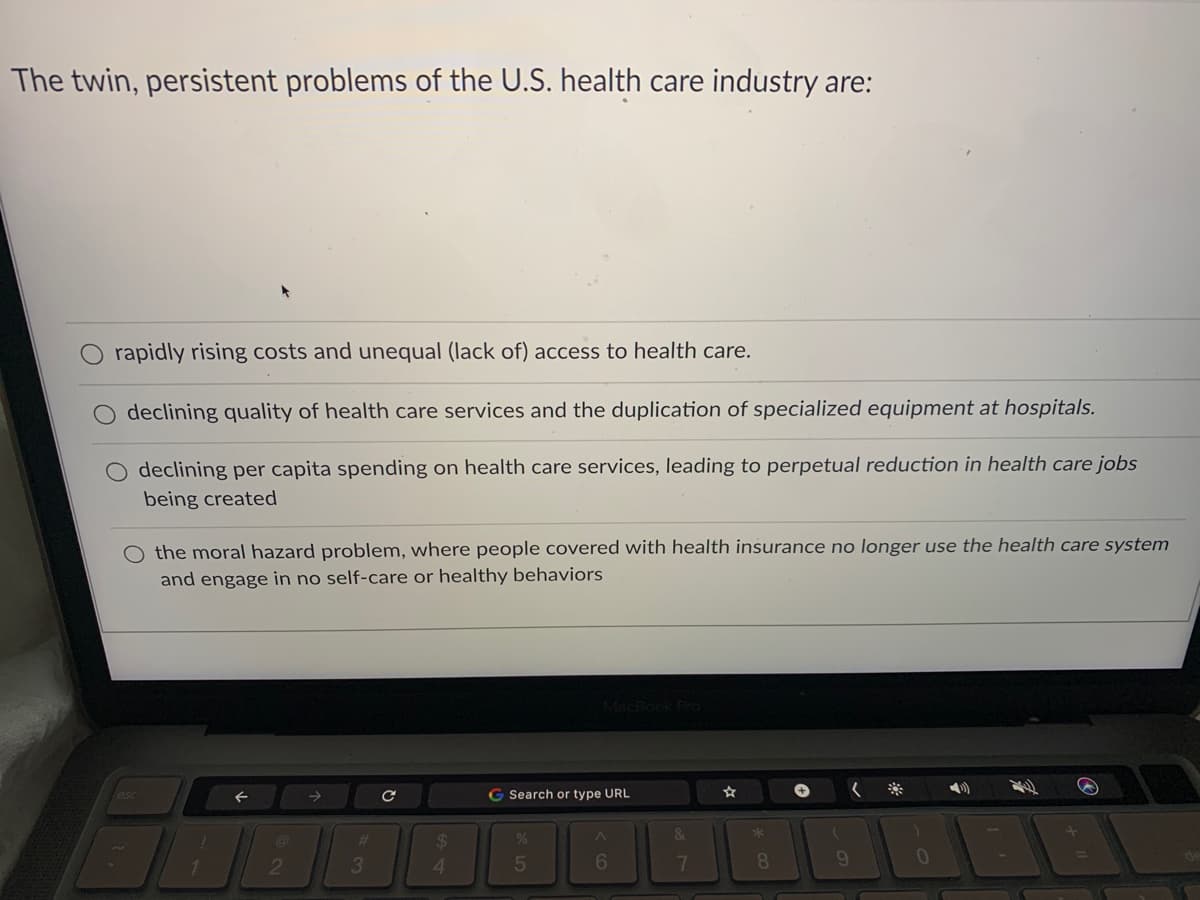The basic economic argument for creating greater income inequality is that: Oa more equal distribution of income will tend to maximize incentives to produce, work, invest, and assume risk. a more uequal distribution of a given amount of income will increase the total utility of consumers. the progressive income tax system and array of government transfer programs already ensures that all individuals and household will wind up with identical incomes. O the richest individuals and households will buy more luxury goods and services, which then create high skilled, high paying jobs for the least educated, lowest income workers.
The basic economic argument for creating greater income inequality is that: Oa more equal distribution of income will tend to maximize incentives to produce, work, invest, and assume risk. a more uequal distribution of a given amount of income will increase the total utility of consumers. the progressive income tax system and array of government transfer programs already ensures that all individuals and household will wind up with identical incomes. O the richest individuals and households will buy more luxury goods and services, which then create high skilled, high paying jobs for the least educated, lowest income workers.
Principles of Microeconomics (MindTap Course List)
8th Edition
ISBN:9781305971493
Author:N. Gregory Mankiw
Publisher:N. Gregory Mankiw
Chapter20: Income Inequality And Poverty
Section: Chapter Questions
Problem 5PA
Related questions
Question

Transcribed Image Text:The basic economic argument for creating greater income inequality is that:
O a more equal distribution of income will tend to maximize incentives to produce, work, invest, and assume
risk.
a more uequal distribution of a given amount of income will increase the total utility of consumers.
O the progressive income tax system and array of government transfer programs already ensures that all
individuals and household will wind up with identical incomes.
O the richest individuals and households will buy more luxury goods and services, which then create high
skilled, high paying jobs for the least educated, lowest income workers.
G Search or type URL
&
%23
24
delete
11
2
4.
5
6
9.
Q
tab
G
K
return
caps lock

Transcribed Image Text:The twin, persistent problems of the U.S. health care industry are:
rapidly rising costs and unequal (lack of) access to health care.
declining quality of health care services and the duplication of specialized equipment at hospitals.
O declining per capita spending on health care services, leading to perpetual reduction
being created
health care jobs
O the moral hazard problem, where people covered with health insurance no longer use the health care system
and engage in no self-care or healthy behaviors
MacBod
G Search or type URL
く
&
*
%23
%24
2
4.
5
7
8.
9.
Expert Solution
This question has been solved!
Explore an expertly crafted, step-by-step solution for a thorough understanding of key concepts.
This is a popular solution!
Trending now
This is a popular solution!
Step by step
Solved in 3 steps

Knowledge Booster
Learn more about
Need a deep-dive on the concept behind this application? Look no further. Learn more about this topic, economics and related others by exploring similar questions and additional content below.Recommended textbooks for you

Principles of Microeconomics (MindTap Course List)
Economics
ISBN:
9781305971493
Author:
N. Gregory Mankiw
Publisher:
Cengage Learning

Principles of Economics (MindTap Course List)
Economics
ISBN:
9781305585126
Author:
N. Gregory Mankiw
Publisher:
Cengage Learning

Principles of Economics, 7th Edition (MindTap Cou…
Economics
ISBN:
9781285165875
Author:
N. Gregory Mankiw
Publisher:
Cengage Learning

Principles of Microeconomics (MindTap Course List)
Economics
ISBN:
9781305971493
Author:
N. Gregory Mankiw
Publisher:
Cengage Learning

Principles of Economics (MindTap Course List)
Economics
ISBN:
9781305585126
Author:
N. Gregory Mankiw
Publisher:
Cengage Learning

Principles of Economics, 7th Edition (MindTap Cou…
Economics
ISBN:
9781285165875
Author:
N. Gregory Mankiw
Publisher:
Cengage Learning

Principles of Microeconomics
Economics
ISBN:
9781305156050
Author:
N. Gregory Mankiw
Publisher:
Cengage Learning

Principles of Economics 2e
Economics
ISBN:
9781947172364
Author:
Steven A. Greenlaw; David Shapiro
Publisher:
OpenStax
